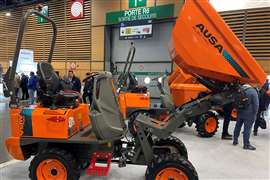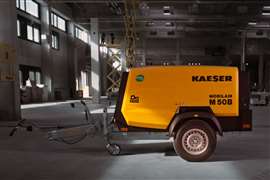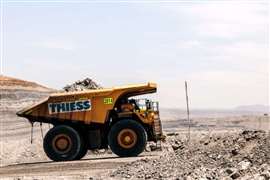OSHA advisory committee introduced to mastclimber safety
30 December 2008

IPAF's International Mast Climbing Work Platform Committee (MCWP) chairman Kevin O'Shea has given a safety presentation to OSHA's Advisory Committee on Construction Safety and Health (ACCSH). His presentation follows a series of accidents in 2008 involving MCWPs and cranes.
O'Shea presented facts to OSHA regarding the market size for mast climbers, what the purpose of IPAF (International Power Access Federation) is and what programs are offered by the Federation to bring safety to the forefront of jobsites. O'Shea also discussed:
- About 12,600 people use MCWPs every day.
- Working hours to put up and dismantle MCWPs touches at 2.5 million hours a year.
- Each day there are seven to eight ‘near misses' on MCWPs.
- Around 4,200 MCWP units operate daily in the US.
Issues on jobsites for MCWPs go hand-in-hand with similar construction safety issues. O'Shea pointed out that insubstantial planking on the front edge of the platform can cause a trip or fall hazard; problems arising with inadequate anchor installation and testing; over- or under-tightened anchoring; ties being used in the wrong fashion; and inadequately trained assessed installers and users.
After presenting OSHA with the safety issues on the forefront of MCWP use, O'Shea introduced the IPAF Guidelines for the Safe Use of Mast Climbing Work Platforms: US Edition 2008, a recently released document that provides working guidelines for MCWP users, installers, owners and rental companies. The free document, available on IPAF's website, covers experience, education and skill verification required for those who want to use a MCWP.
"This is a huge step forward for IPAF and it is the most senior recognition of IPAF's expertise and breadth of representation within the industry in the United States," O'Shea said. "IPAF has worked tirelessly on behalf of its members and the industry in general to raise standards and improve the performance of powered access worldwide. US manufacturers and major rental companies in the powered access business are beginning to see just how valuable IPAF membership will be as the industry progresses through its next phase of development."
The committee was impressed with the Powered Access Licensed-Registration Card (PAL Card) given to successful trainees after an assessment and training course. IPAF administers its training activities in North America through a subsidiary, Aerial Work Platform Training (AWPT), with trainees awarded the PAL Card upon training completion. PAL Cards are valid for five years and are recognized across the globe as proof of training on specific machinery.
O'Shea was invited to speak after OSHA's recent concern regarding a move to build a safer industry that focuses on best practices and regulation.






